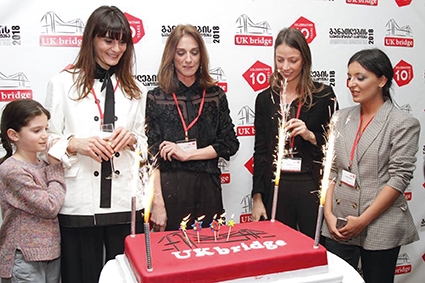The UK Bridge Education Fair & The Future Journalist Competition
Interview
On February 24, the 2018 International Education Fair was held at Rooms Hotel in Tbilisi. The fair brought together schools and universities from 12 different countries and gave attendees the opportunity to meet with education institution representatives and find out more about the various courses and programs available for those wishing to learn abroad.
This year sees the 10th anniversary of UK Bridge, the fair organizer and a company which has facilitated the travel-to-learn experiences of many of Georgia’s youth to numerous world-leading schools in Europe and the USA.
GEORGIA TODAY spoke to the founders of UK bridge, Anka Vetsko and Nutsa Kuridze, about the fair and the Future Journalist competition it launched with Georgia Today Education in February.
Tell us about the beginnings of UK bridge
Anka: We’d been working in the British Council for around six years. Nutsa was the Head of the International Department and we needed to travel abroad as part of our job. We then decided to establish a company that offered overseas study opportunities. Nutsa had a lot of experience by that time, so we made the decision to leave behind a stable, highly paid job in the British Council and found UK Bridge in 2008.
Tell us about the programs you offer
We can boldly say that any person who decides to take advantage of the services we offer, who is interested in learning abroad, will certainly find the course they want. The list of courses and programs in schools and universities is infinite. Most popular with Georgian students are the summer schools designed for children aged 9 to 16 years. But there are also winter and Easter courses for children, and language and professional courses for adults. If one has no time to do a Master’s program, which is usually long, you can take a short course - from two weeks to six months - in an intensive program and get the certificate. We also offer undergraduate and Master’s programs, as well as offering children the chance to attend boarding school and preparatory courses. One of the most popular trends right now is for teachers to create small groups of students based on their interests.
We also advise and send students to the United States, but it is harder than getting into European countries and the UK.
Tell us about the Future Journalists competition you’re running in collaboration with GEORGIA TODAY
Our cooperation with GEORGIA TODAY started a long time ago with a magazine for children called ‘Kids Today’ where we jointly held a competition for children and sent the winning child to summer school in the UK. We do the same every year- sending one child, chosen through a competition, to summer school. Right now, we’re working with GEORGIA TODAY Education on a young journalists’ competition. The winner will have the chance to attend a summer school specialized in journalism. Most summer courses cost a lot of money, and this contest gives the unique chance for a student to attend a free two-week course at Wimbledon Summer School in the UK. Summer schools are an important experience for each participant, since they are more motivated after their return and want to continue broadening their experiences. I wish success to everyone who enters the competition and look forward to handing the Future Journalist's prize to the winner.
During last weekend’s UK Bridge Education Fair, we also spoke to Kieran Hayde, the Marketing Manager of the Wimbledon School of English.
What makes Wimbledon stand out from other schools of its kind?
Wimbledon School of English is one of the oldest English schools in the UK. It was founded in 1964 and is one of the top performing English language schools according to British Council inspection results. So, the reason UK Bridge decided to partner with us comes partly because we have a journalism course but also because of the fact we are one of the highest ranking in the UK. When UK Bridge was founded, we were among the first partners and they have been sending students to us ever since.
Tell us more about the Journalism course that the winner of the Future Journalist competition will attend
Primarily, students come improve their English. We teach right up to C2 level. So even if students are from a bilingual or international school, the morning general English class can still challenge them. In the afternoon, they can take the Junior Journalism course. The idea is that students interested in journalism as a career or who want to develop their language in that field, will be taught specific terminology and the different skills they might need, such as how to handle face-to-face interviews, note taking, writing articles, etc. They also create their own podcasts, and at the beginning of the week they are given a project with a theme of their choice: it all builds up to the final day of the week when they present the podcast to the entire school.
What’s a typical day at the summer school like?
There are many options and most days at the school are full of activities and workshops. Whether you’re interested in sports, art or crafts, there is always something to interest you aside from general courses during your stay. In the evenings, students are free to spend time with their friends or chill out. Three times a week, students leave the campus on excursions into Oxford or London, for example, which is just an hour away. It can be a walking tour or a museum visit, and they always have lunch and time to shop. Excursions are a fun way for them to learn more about the culture.
Find out more about the competition on georgiatoday.ge
Sopio Javakhishvili












